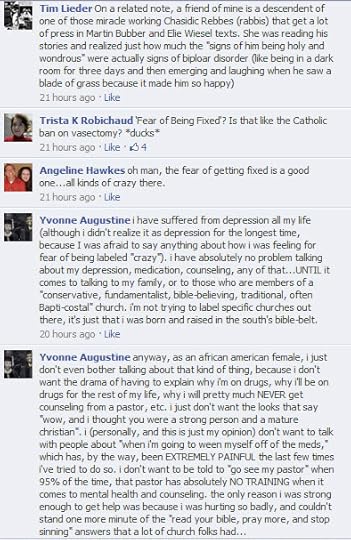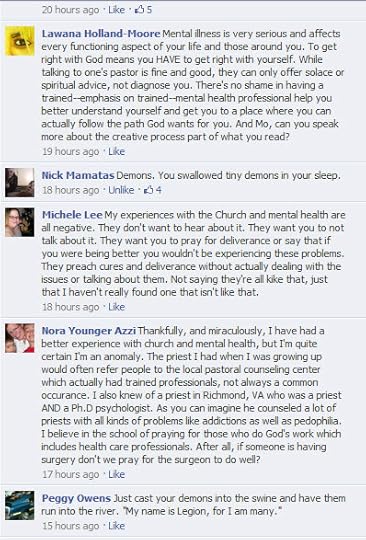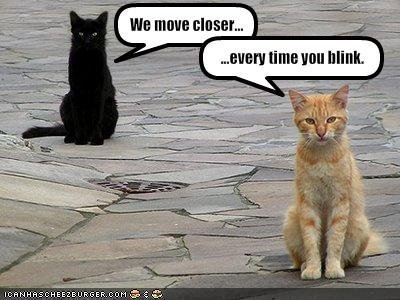Maurice Broaddus's Blog, page 39
February 20, 2012
Welcome Back Broaddus
I'm loving teaching the creative writing classes down at the Writers' Center of Indianapolis. A few weeks ago I did the kick off Introduction to Speculative Fiction class that focused on what makes up fantasy, science fiction, and horror, the state of the markets, and the business of writing. Now doing four weeks on various aspects of "preparing to write" (Brainstorming, Character/Dialogue, World Building, and Plotting). By the way, walk ins are welcome. It helps that I have a really good group of folks that I'm working with. The preparation for the classes forced me to sit down and think about process a lot (READ: even though this isn't a writing blog, per se, expect plenty of blog fodder from it).
Going with the teaching thing, I've been going down to Outreach Inc once a month to do mini-workshops on creative writing. I love those kids (I'd say they're too old to be called kids, but I'm coming to terms with the fact that somewhere between last year and today, I got old. Come on, anyone humming "welcome back, welcome back, welcome back" after reading the title to this blog can feel me). It's a pure joy to engage their world, hear their voices as they tell their stories and express themselves.
And while I haven't been doing as much subbing this semester, I still have been going into my sons' classes as a writer cheerleader. (This, by the way is what Second Story does as an organization, which is why I love that organization so much).
My big take home lesson: kids love to write. I can't walk into my son's class without one of them (READ: a half dozen of them) shoving their latest ten pages of story into my hands. And these kids write well (especially compared to what I was producing at their age). A lot of the times, schools kill the joy of writing with creative writing given the short thrift and other art programs slashed. I'm not blaming the teachers. They're hamstrung having to teach to IStep or iRead or the latest metric that supposedly measures learning and don't get to actually … teach. Some of the teachers don't feel like good writers themselves and thus don't feel qualified to judge or critique it. I think one of the brilliant things my oldest son's teacher has done has simply carved out time for the kids to write.
And the kids in my sons' classes challenge me too. They want to read my stuff. While I can show them the covers to the Knights of Breton Court series, they are going to have to wait a few years to become consumers of mine. (There was an incident involving my sons taking some of my author copies to school). So I'm working on a few things I can take into schools now. Plus, after staring down a room full of fifth graders, any other public speaking doesn't seem nearly as scary.
February 15, 2012
Five Questions with Ekaterina Sedia*
 Okay, I couldn't just let it go with a review of The House of Discarded Dreams. I wanted to ask Ekaterina Sedia a few questions about her story and her process.
Okay, I couldn't just let it go with a review of The House of Discarded Dreams. I wanted to ask Ekaterina Sedia a few questions about her story and her process.
1. What made you decide to write the character Vimbai. Did you have any trepidation about writing "the Other"? What did you draw up on to create her?
Well, my interest with this book lay primarily in trying to write about the conflict between first and second generation immigrants – something I do have some experience with. I did however want to write someone different from myself, and since one of my closest friends is from Zimbabwe and we often talk about some of the common experiences and frustrations, the choice seemed obvious.
To me, the Other component was primarily about writing an American person – something I do quite a bit. Not to dismiss race as a crucial component, but what "Other" is certainly depends on one's cultural perspective. So Vimbai was really someone I imagined my children would be like – a person who doesn't share her parents' culture and yet not entirely embraced by the world around her, someone who is adrift in more senses than one. And being adrift is something I know and can write about!
2. Is African folklore an interest of yours? What made you decide to explore this for a fantasy novel? With themes of the lingering effects of colonialism at play in your book, what sorts of concerns did you have about cultural appropriation as you wrote it?
Yes, it is of great interest, along with other non-Western narratives. In all my books, I try to break away with the traditional linear three-part arc, so embracing a different tradition certainly gave me a good template of doing so. As for imperialism: I don't think one can honestly write about the world today without talking about it. I mean, we grow coffee and cocoa where we grow it because of it – imperialism shaped the world, and going about as if it was just that brief phase that ended without any long-lasting effects is disingenuous, to say the least.
As for cultural appropriation, it's a several-fold answer. It's always a concern, sure. First, I was reluctant to use existing myths, so I used them very sparingly and in close consultation with Tait, the aforementioned friend. The myths that characters tell each other are all made up but within bounds of existing folkloric tradition (such as characteristics of animals) or literary ones (man-fish is a Zimbabwean urban myth of sorts, explored by Marechera, and one of Vimbai's stories is a riff on Tutuola.) Europeans tend to be very liberal while "collecting" folklore and I tried not to do it – that is, I went by definition of creative transformation rather than mere copying as described in African customary laws folklore copyright protection (summary document here: http://unesdoc.unesco.org/images/0012/001277/127784e.pdf).
Then, Vimbai herself is a cultural outsider to her parents' tradition – that is, she is second generation and is culturally an American, with not as much insight into her parents' culture as she would like. I would not be comfortable writing about Zimbabwean folklore from the insider perspective, because I am not an insider. I was careful to speak about the culture rather than for it, which I believe is a crucial distinction between talking about other cultures and appropriating them.
Finally, I do realize that my insight is limited, and the book is really much more about the immigrant experience – something I do know about first-hand. And this is something I spoke a lot to my friend about. He was very supportive of the book, but he also said, "You do realize that some Zimbabweans will not like this book because it was written by a white woman." And yes, of course I do realize that, and you know what? It's a valid position. I think it's an important thing, to accept that you won't have a unanimous approval, and to not be hurt about it. Westerners writing about other cultures either seek validation or just default to "haters gonna hate so screw them, I'll write what I want" positions. So for me, I think it's important to do one's best, but not expect that everyone will love you for it. I mean, I myself am wary when Westerners write about my culture, so who am I to expect a different treatment?
3. You created a world within a house. [I'm not going to lie, you had me with naming parts of the world after Malcolm X.] How conscious were you of making the house a character as well as a reflection of Vimbai?
I kind of had to, didn't I? If we're going to wander through someone's subconscious for a few hundred pages, have to make it relatable somehow!
4. Very little of this book smacks of "typical" fantasy. Was Maya's quote "I don't like these weird quests" a critique of fantasy? What sort of tropes are you tired of seeing in fantasy novels?
It was more of a comment on general Western narrative. Fantasy (and other) books tend to be terribly uniform in structure, to the point where any deviation starts to look like a mistake. It's a common thing with all my books; with The Secret History of Moscow, some readers saw the endless backstories as a distraction form the main plot, and it's of course a valid interpretation, but to me the backstories were the book. So yes, I'm aware that maybe my expectations come from being raised on a different literary tradition, with a much more diverse set of narrative templates, and quests just aggravate me, and rising tension thing gives me heart palpitations. Tropes is not what gets me tired, but rather the same constructs being played to death. Good, evil, confrontation, escalating obstacles, yawn. (And banter. Too much banter everywhere! And get your spunky heroines off my lawn.)
5. Young adult. African American interest. Fantasy. There are a number of places your book could find itself in a bookstore. Who do you imagine is the audience for this book?
I'm hoping for immigrants, but really, any audience is welcome. As long as people are reading, I am happy.
*I have a loose definition of "five" in my world
February 14, 2012
The House of Discarded Dreams – A Review
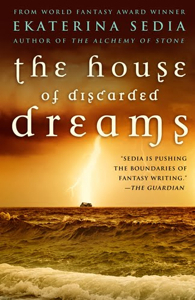 Ekaterina Sedia has been one of those writers that I've always been "meaning to read a book by". That is, I've been a fan of her short fiction (insert plug for Dark Faith here) and had made a note to keep my eye out for some of her longer work. Because Paul Jessup constantly whispers in my ear like the Jiminy Cricket of speculative fiction, I picked up her book The House of Discarded Dreams (as well as Genevieve Valentine's Mechanique, but anything I have to say about Mechanique has already been covered by Nick Kaufmann).
Ekaterina Sedia has been one of those writers that I've always been "meaning to read a book by". That is, I've been a fan of her short fiction (insert plug for Dark Faith here) and had made a note to keep my eye out for some of her longer work. Because Paul Jessup constantly whispers in my ear like the Jiminy Cricket of speculative fiction, I picked up her book The House of Discarded Dreams (as well as Genevieve Valentine's Mechanique, but anything I have to say about Mechanique has already been covered by Nick Kaufmann).
Booklist describes The House of Discarded Dreams like this: "Vimbai, who studies invertebrate zoology because of a fascination with horseshoe crabs, moves into the house on the beach in order to escape her Zimbabwean immigrant mother's intensity; she finds something strange and beautiful. There are two roommates: [Felix], who has a pocket universe where his hair should be, and Maya, who works in an Atlantic City casino. Vimbai's dead grandmother haunts them, a ghostly presence who tells Zimbabwean children's stories and does the dishes. When the house comes unmoored and drifts away to sea, Vimbai must bargain with ghostly horseshoe crabs, untangle the many and varied stories that have come loose in the vast worlds of the house, and find a way home. From Maya's urban nightmares to Vimbai's African urban legends, the house is filled with danger and beauty and unexpected magic."
It's easy to get lost in the lush, unfamiliar world Sedia creates, however, its unfamiliarity is one of its best parts. Drawing on African myths, with an African American woman as protagonist, The House of Discarded Dreams is a creative journey of self-discovery. Vimbai's self-exploration questions her sexuality, her cultural identity, and her passage into adulthood.
The emotional core of the book is Vimbai's attempts to find her own way despite the long shadow cast by her mother. Sedia perfectly captures not only the immigrant experience, a familiar thread in her work, but also that struggle of being caught between cultures. [I'm either biased or an authority. Besides majoring in Biology in college, I'm the son of a Jamaican mother and an American dad, but I was born in England. My mother's Jamaican heritage was such a force in our household that she often referred to us (African Americans) as "you people." ]
There are times when the sheer imagination of the book threatened to overpower the narrative with its anything could happen anytime sensibility. Thus Vimbai was never truly in jeopardy because some new magic would manifest to save her. Felix, as a character, gets lost in the shuffle. There are times when the story seems to meander, caught up in its own sense of whimsy, but this novel isn't meant to be a thrill ride romp. It's a beautiful coming-of-age fairy tale where the power of fantasy (and story) isn't left behind, but embraced.
I know I was late coming to this party, but I didn't want folks to have slept on a gratifyingly original fantasy novel. The bottom line is that Ekaterina Sedia usually leaves me feeling like I under-imagine my stories. Or for that matter, that we don't see enough magic in life.
February 13, 2012
Being Creative, Christian, and Crazy*
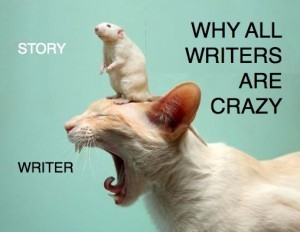 At my counselor's the other day, my wife and I were going over how life has been for us lately. We described our time as I've been coming out of my latest depressive cycle and entering into my manic time. Our counselor's ears perked to increased attention. Apparently the words "manic" and "depression" when used so close together are magical words which signal the need for further exploration (not just one of my favorite Jimi Hendrix songs).
At my counselor's the other day, my wife and I were going over how life has been for us lately. We described our time as I've been coming out of my latest depressive cycle and entering into my manic time. Our counselor's ears perked to increased attention. Apparently the words "manic" and "depression" when used so close together are magical words which signal the need for further exploration (not just one of my favorite Jimi Hendrix songs).
As a part of life with a writer, we'd rather gotten used to the cycle. Bipolar Disorder runs in both of our family lines. We've both lived with a bipolar parent and that condition plays out in a variety of different ways. Thing is, I straddle a weird nexus with this as being unhealthy mentally is embraced in the artistic community (we LOVE the image of the eccentric writer), a source of embarrassment in the black community, and something to be ashamed of in the church** community.
It's not the first time the notion of "getting medicated" has come up in my life. It took me a long time to drop the resistance to going to a counselor, but I still hesitate at the possibility of being medicated. I'm lumping this under the category "fear of getting fixed":
1. "Novelists are damaged people, and writing is how they repair their psyches." ~ David Morrell. That quote holds a lot of truth to many writers. I've always had this quiet notion (lie) that I'd never be a great writer because I wasn't cracked enough in the head, one of those mad geniuses. Maybe it's part of the romanticized ideas of what it means to be a writer, but I've always lived with my demons, letting them play out on the page. And I've thought that "getting fixed" would lead to the ruin of the stories I write. Here's the analogy I've used: the best comedians work from a place of pain. What happens to their comedy when they have found some measure of healing?
2. Drugged out zombie. Now I've not been one to take drugs of any sort in the first place. I think our culture is quick on the trigger to medicate itself as is. That being said, I've been doubly scared that drugs that would "stabilize" me would also hinder my creativity. My big fear is that my mind would function as if it was moving through mud, and I'd be unable to string two thoughts together.
All of this angst-ridden noodling is done under the long shadow of how some in the church community tend to approach issues of mental health.**** Far too many times, any sort of mental issue, for example, depression, is met with an attitude that the sufferer demonstrates a lack of faith or has some other sort of failing in their spiritual walk. The "treatment" as it were amounts to reading the Bible and praying. Diseases of the mind somehow can't be treated on a physical basis, as opposed to a toothache or having cancer.
Spiritually speaking, the problems should be confronted on three fronts: as a spiritual problem, an emotional problem, and a biological problem (spirit, mind/heart, and body). It's like whenever we deal with the issues of mental health, we only address one area when all three have to be addressed to find wholeness. For example, as a thought experiment, think of how a past wound done to us can turn into unforgiveness and bitterness thus becoming a spiritual stronghold in your body. Who knows how this might throw off your brain chemistry. Don't get me wrong, this is an oversimplification of things, but hopefully you see where I'm going with that.
 This is me just getting mentally prepared for taking the assessment. We're not there yet, and I'm a long way from having a "label" to deal with (and even then, that label wouldn't be my identity, just part of who I am). It's just what I'm thinking about. There is wholeness to be had. God created me as a creative person and I will continue to create. I will always have stories to tell.
This is me just getting mentally prepared for taking the assessment. We're not there yet, and I'm a long way from having a "label" to deal with (and even then, that label wouldn't be my identity, just part of who I am). It's just what I'm thinking about. There is wholeness to be had. God created me as a creative person and I will continue to create. I will always have stories to tell.
*I almost went with "I'm Not Crazy, I'm a Christian", but I think I'll save that for a different kind of blog post.
**I'm defining "church" as American Evangelicals, as that's been the majority of my experience. I'd worry about offending them, but the "take two verses and call me in the morning" crowd doesn't read me.
***I could say the same for hip hop artists who have their muse in the cauldron of pain and poverty of their life on the streets … and then what happens to them once they've made it big and gotten rich.
****When I wrote my blog Male Pattern Depression, I was deluged with e-mails from guys who felt like this was something they couldn't talk about this publicly. I was fascinated by some of the discussion on my Facebook page leading up to me writing this blog post.
February 12, 2012
Being Creative, Christian, and Crazy (Pre-Discussion)
February 9, 2012
Finding the Cool Kids Table
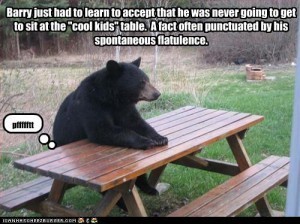 When I started hanging out in writers circles, going to conventions and stuff, I had it in my head that there was a cool kids table. I distinctly remember at the World Horror Convention in New York City, a time when I was standing around while Gary Braunbeck, Lucy Snyder, Linda Addison, Gerard Houarner, Tom Piccirilli and his wife Michelle were talking. They were planning on going out to dinner then they turned and invited me to join them. "Are you sure it's okay?" I asked as I was filled with all kinds of "do you know who you are?" type thoughts as I was "just a nobody." My big take home lesson was that while I was busy thinking that maybe I had graduated to the adults table at Thanksgiving, they had the attitude of "all you had to do to earn a place at the table was to scoot to the table."
When I started hanging out in writers circles, going to conventions and stuff, I had it in my head that there was a cool kids table. I distinctly remember at the World Horror Convention in New York City, a time when I was standing around while Gary Braunbeck, Lucy Snyder, Linda Addison, Gerard Houarner, Tom Piccirilli and his wife Michelle were talking. They were planning on going out to dinner then they turned and invited me to join them. "Are you sure it's okay?" I asked as I was filled with all kinds of "do you know who you are?" type thoughts as I was "just a nobody." My big take home lesson was that while I was busy thinking that maybe I had graduated to the adults table at Thanksgiving, they had the attitude of "all you had to do to earn a place at the table was to scoot to the table."
The thing is, too much of our lives, and by "lives" I mean social traumas and scars, can be traced back to high school. We envision a cool kids tables, those kids who defined who was in and who was out. We live with this sense that there is a community that we're being excluded from, that there are cliques not open spaces. That certain people can marshal people around them while you toil away alone, unwanted, and unappreciated, all of which touches on older wounds of feeling unloved.
This feeling of exclusion speaks to our longing for community. We want to connect, we want to be accepted. We want to be noticed by "them": the successful, the cool, the people who are where we want to be. We lose sight of the people already in our lives and spheres who have been supporting us all along.
Few people want to be the outsiders. Even the self-labeled outsiders often seek the community of like-minded outsiders. So while we may feel like we're the ones always reaching out only to be left on the outside looking in, we need to be careful to not internalize that feeling of being excluded to the point where we become bitter and neurotic about it. We need to be mindful of the friends and community that we already have in our lives. And keep in mind that so many of us writers are SO good in social situations/socially adjusted in the first place. (I'm stunned that there's any sense of community at all not that we don't do it especially well.)
There are no gatekeepers to relationship building. No social ladders to climb. Only people. Yes, there are climbers out there and people just out to mercenary network who WILL name-badge people, count you as a "nobody", and move on. More times than not, however, the community at large is filled with people who can never have too many friends. So I need to stop being shocked that people in the genre community are so welcoming and nice when approached, after all, they know. Growing up geek, they've been excluded, been on the outside looking in, and had been given a helping and welcoming hand as they were rising. And they are just as shocked to find out they now sit at the cool kids table.
File under: The emotional life of writing
February 3, 2012
And now a moment of Dr Who neepery…
I wish I had a blog post to go along with this. Speaking of all things nerd, a couple of interesting links:
-Alan Moore Is Wrong About 'Before Watchmen'
(Come on: STEAMPUNK DALEKS!)
January 30, 2012
Slush Pile Warrior Part Deux
I recently wrote a piece for the SFWA Bulletin on things I learned from the slush pile of Dark Faith. I figured it would be a while before I'd have anything good to share again, after all, I JUST WROTE ABOUT WHAT I DIDN'T WANT TO SEE AGAIN. As of December 1st, here's what the slush pile for Dark Faith 2 should have looked like: stories I've solicited. Seriously, that was all that should have been there. So you have to wonder what caused this series of twitter updates from me not too long ago:
-So @jerrylgordon & I have waded into the Dark Faith 2 slush pile (which shouldn't even exist for 12 more days)…
Total unsolicited submissions received before the January 1st date: 63.
-Don't brag about your MA, MFA, and Ph.D in your cover letter if you still can't read guidelines that say we're not open til Jan 1st…
Actual cover letter. I actually get a nervous chill when I see folks laying out their MFA credentials rather than their publishing creds. It was at this point I questioned whether to have people bother to include cover letters, but Jerry Gordon insists that it helps him weed folks out. I don't think that's a good thing for many writers as I suspect poor cover letters give him an excuse to pass on your submission…
-Cover letters shouldn't be so bad that your co-editor continues to read them out loud just to punish you. Much less through his laughter.
If you feel the need to tell us your plot, please don't explain the "symbolism" for us. If you have a deep space, science fiction metaphor of the conquest of the Aztecs and a character who is a stand in for the Tea Party, let the story stand on its own. And don't call your shot about how entertaining it's going to be (especially if it isn't). I will say that my favorite submission letter had this line:
"I have dedicated my life to learning the craft of writing so that my fiction can not only be understood by the reader, but felt, experienced on all levels of sense. The attached story is a product of much research, and a little obsession."
-We're dangerously close to starting a bad slush pile submission drinking game (thanks @mlvalentine), but @jerrylgordon has to drive home.
Speaking of Monica Valentinelli, she sent in the "perfect" submission letter:
Dear Mr. Broaduss and Mr. Sesame St. Gordon:*
Earlier today I sent you a profussional cover letter** and the 1st ten chps of my novel which also works as a short story. I am, quite frankly, apalled by your sheer lack of respekt! How DARE you ignore my submision. You call yourselves Christians? I spent two years werking on that story and the lest you could do is respond in a timely manner. Your blatant disregard for my work hurt my fellings. It really, really did! You shuld axe God for forgiveness.
Did you even read my cover letter? GOD TOLD ME TO WRITE THAT STORY HOW CAN U NOT EXCEPT IT.*** "The End Is High" is a reimagining of the Book Of Ruth crossed with the Book of Revelations. If you look closely, you'll notice how I was very careful in my interpretation of the sex scene between The Beast of the Apocalypse, the Archangel Michale, and Ruth's father. All the details are there and this is why beastiality is a bad thing and why the horsemen are comung for us. Do NOT miss this opportunity to spread the good news! The end of 2012 is almost upon us and it is my missun to get this story out to as many ppl as possible to warn them not to fall into adultry or have too many beers cuz the chosen r going up to heaven on December 21, 2012 at midnight.
I look forward to hearing from you. I no, in my heart, you'll do the right thing.
Yours in peace my brotherz.
- The bestest author evah!
Number of people who can get away with a letter like this: Monica Valentinelli.
-So @jerrylgordon had to hand me a glass of Riesling as he read this cover letter. Something to drown the pain of this submission…
Hmm, I'm beginning to question just how much Riesling can be attributed to the Dark Faith submission process…
-Another free pro tip, having your "assistant" send in your novel submission to an anthology (that's not open) STILL doesn't help your cause.
Mind you, said assistant has already submitted two novels thus far. The final total of novels submitted to us before the January 1st date: 12.
Dear Sirs,
I am sending you the manuscript of the first instalment of my fantasytrilogy,[SERIES TITLE DELETED TO PROTECT THE INNOCENT]: the 100 000 word novel [TITLE WITH THE WORDS 'SHADOWS' AND 'REALM' THUS SEPARATING IT FROM ANY OTHER FANTASY NOVEL OUT THERE].
-Here's a pro tip I shouldn't have to offer, you probably shouldn't take shots at the editor you're submitting to IN YOUR COVER LETTER!
"This is a story for those people who thought I had 'negative talent'" a reference to my blog post … 7 years ago. Too bad his story came in two months before we opened.
Before I get too carried away with mocking our slush pile, I try to keep in mind: I'm sure I have been the object lesson in an editor or two's bar story; I'm sure I WILL be the object lesson in an editor's bar story; I'm still going through the same submission process (even receiving a rejection the day I do this). Ah, the slush pile is a many splendored thing …
You're not the boss of me now
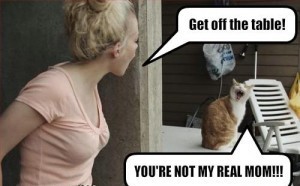 I had a passel of my nieces and nephews over the other day (which made for a house with 8 kids, a clear reminder about why me and my wife stopped at two). Of course they eventually got out of control (seriously, dear sister of mine, buying them paintball guns for Christmas?!?) and we had to reign them in a bit. Half way through me telling them to calm down or else there would be consequences, I suddenly became self-conscious of the fact that I was an authority figure.
I had a passel of my nieces and nephews over the other day (which made for a house with 8 kids, a clear reminder about why me and my wife stopped at two). Of course they eventually got out of control (seriously, dear sister of mine, buying them paintball guns for Christmas?!?) and we had to reign them in a bit. Half way through me telling them to calm down or else there would be consequences, I suddenly became self-conscious of the fact that I was an authority figure.
I'm so distrustful of power and authority, I question it even when I'm the one exercising it.
"Submit to one another out of reverence for Christ." –Ephesians 5:21
Maybe it's a modern/postmodern thing, but I chafe under the yoke of authority. Any authority. I would find it difficult to believe that I'm the only person like this. I know it's popular thinking for some people to point to the 1960s/1970s as to when the youth in America began to not only question, but outright distrust authority.
I suspect the answer it a lot closer to home. Some of us grow up in households where power was exercised in anger or abusive. Some of us had leaders who exercised their authority either as compensation for their own brokenness or to further their own ego/agenda. We experience so many examples of power misused that we don't trust any of the leaders over us. The sad thing is too few of our leaders prove themselves to be truly honorable enough to lead. Then couple that with the fact that with us buying into the myth of our freedom and independence, and we don't want to be told what to do (or even the idea that we're being told what to do).
We have a limited list of folks we consider ourselves answerable to: parents (the first authority in our lives; an authority despite how we often treated them growing up), our bosses (the authority by rule of pay check), our spouses (an authority by mutual pledge, though the idea that they may be an authority we're accountable to may still fill us with quiet unease). And that's before we get to the list of authorities we're accountable to through the force of power they exercise, be it the tip of a gun or the penalty of law: civil authorities, police, government officials (offices to be honored if not the people who occupy them).
But reviewing those verses again, it sounds a lot like we're in a constant pact of mutual respect and submission to one another. That we're to be constantly pushing in on one another. That we shouldn't be afraid of uncomfortable or unpleasant conversations because they have to happen when you're concerned about someone.
As an authority, I don't exercise my "power" like a tyrant; not in anger and not just cause I can (though, believe me, there's plenty of "because I said so" that I have to remind myself to not default to). I have to remind myself that I'm not there to be my children's or nephews'/nieces' friend. I'm there to help raise and mold them into the best "thems" they can be because I love them and want them to grow into adults who are respectful, loving and make good decisions. Paint ball fights in the house does not fall into any of those categories.
January 25, 2012
Siege – A Review
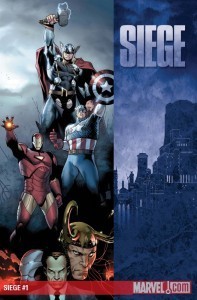 Written by: Brian Michael Bendis
Written by: Brian Michael Bendis
Art by: Olivier Coipel, Mark Morales
Published by: Marvel Comics
There was a telling moment in the issues of Thor not too long before Siege, Marvel's latest event comic. Thor was rightfully angry with Iron Man who had helped create a clone of him which was used during Civil War and killed (Black) Goliath. So during a climactic (and AWESOME) battle with Iron Man he says "At this moment I have more pressing business to attend to. But in the time to come, be assured that you and I will finish … discussing … your violation of my person, my genetic code, and what was once a friendship that I valued."
"Your known scientific description of the universe is false." –Loki
According to Marvel's marketing, Siege was "Seven Years In The Making". Beginning with Avengers Dissembled which led into House of M, thus unraveling two of the pivotal super hero teams in the Marvel Universe, the Avengers and the X-Men. Next up came Secret Invasion which didn't have the long term reverberations it might have had because there was no chance for the heroes to catch their breath, but it did lay the groundwork of paranoia and distrust which fed into Civil War. The fallout from that story lasted years as we had outlaw heroes, including Nick Fury going underground, and Norman Osborn handed the keys to the kingdom as he was put in charge of National Security. Thus we had the morally ambiguous Dark Reign, with the Dark Avengers, though we also saw Iron Man, Captain America, and Thor through some their lowest points as well as their rebirths. All setting the stage for Siege.
What Siege is about in particular, is Norman Osborn being goaded by Loki into invading Asgard. Due to the events surrounding the return of the real Thor, Asgard currently floated above the Midwest heartland. It is essentially an incursion of a foreign nation into the heart of America, after all. Not just any nation, but a city-state of gods. So Osborn assembles his forces, the Asgardians rally, the Marvel heroes (minus the X-Men, oddly enough) don't sit out this opportunity, however, neither do the other Marvel villains.
Loki at the heart of villainous machinations was how the Avengers assembled in the first place. With Siege, Captain America, Iron Man, and Thor are forced to work together again, exactly what the series was designed to do. It might as well have been called Avenger Resembled.
Siege works for several reasons. It is pure pulp insanity. There is no decade's worth of continuity to get bogged down in. If you were a current reader of comic books, you could jump in just fine. All you needed to know was that everyone was pissed at everyone. Also, Brian Michael Bendis (Powers), the chief architect of Marvel's seven years of events, was at his best. He has always been one of the best superhero writers in the business, but the chief knock against him has been that while he knew how to imagine and craft these events, he had trouble executing them. The payoffs often fell flat giving way to his "talking heads" brand of resolution.
Siege has a more cinematic feel. The reader feels engulfed in a Jerry Bruckheimer film filled with lots of action, serious butt-kicking, and a fast paced feel. There no padding (stringing the series out to six or eight issues needlessly). No loads of internal conflict (no room for talking heads). It's pretty much like the bulk of the Marvel universe's heroes, after their respective storylines, simply needed to vent.
"We all have tools. We all have areas of excellence. We all have ways that we can shape the world." –Loki
We all have stories that we've chosen to live by. Sometimes it's only a matter of choosing the one best able to form you into who you were meant to be. Sometimes it's hard to get a vision of what it means to lead missional and intentional lives – to join in with Christ's redemptive mission. Christ's good news was that the kingdom of heaven was now, and we can join him in being a blessing to others. He came to give life, full and rich life, full of joy and color.
The values of the "kingdom" run contrary to the ideas of "empire" (especially Norman Osborn's vision, which encapsulates all of the negative values of empire in an extreme). The hope of kingdom holds the hope of healing the effects of imperial violence. Heroes, by example, can inspire people to renew a spirit of community and call them to take control of their lives and re-establish cooperation. They can foster a sense of community as people learn to come to each other's aid, restore mutual assistance, and work toward regaining and rebuilding trust. All of which are needing in the Marvel Universe after the wringer they've all been through.
"So if you're smart enough to keep fighting you just might do something that defines your life." –Nick Fury
Siege, ironically enough, was a superhero Ragnarok. It wraps up the mischief of Loki, the life of the Sentry (hopefully for good – was there ever so tiresome a character that was pivotal mostly because we're told he's pivotal?), the reign of Norman Osborn, and the days of the "Superhuman Registration Act."
The art was amazing, employing the grand scope feel that has taken over books when they felt they had an epic story to tell. Olivier Coipel was in rare form. There were three major deaths during Siege and one was depicted with such brutality, it was "that moment" in the book, the one where the reader's jaw drops and wants to high five his buddy next to him. In four issues, Siege was a roller coaster of super-hero action.


